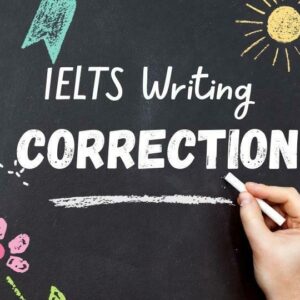Evaluation criteria to assess IELTS Speaking test
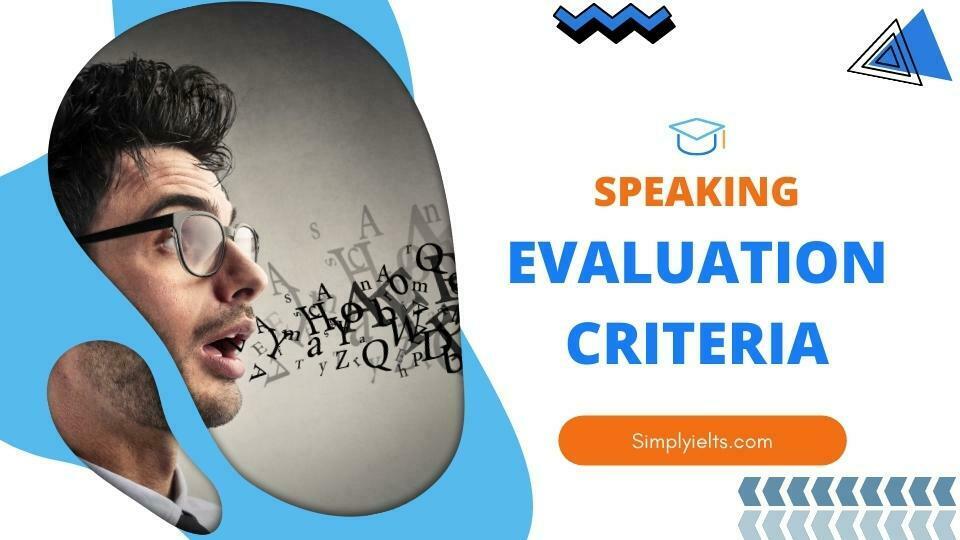
Evaluation criteria to assess IELTS Speaking test are, in a way guidelines released by IELTS. They exclusively state which characteristics in a student’s speech are desirable. These evaluation criteria for IELTS Speaking section are as follows.
- Fluency and Coherence
- Lexical Resource
- Grammatical Range and Accuracy
- Pronunciation
Each area is given a score between 1 and 9, which is the highest, and the final speaking score is the average of all four.
Evaluation criteria to assess IELTS Speaking test in details
A. Fluency & Coherence – Guidelines
• speak without noticeable hesitations, repetition, or self-correction (fluency)
• give well explained answers, not short ones (fluency)
• connect your thoughts with a range of linking words (don’t overuse them) (fluency)
• answer the questions clearly and logically (coherence)
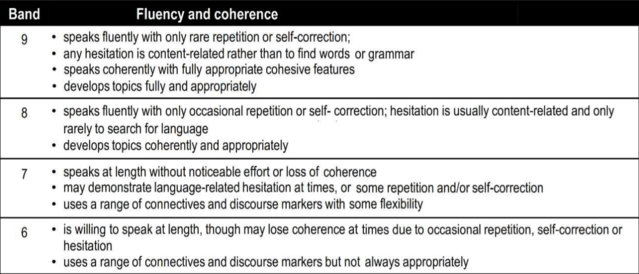
What is fluency? Whenever we were taught about fluency, you were given examples of newsreaders. We were told, “look, how fluent they are”. As a result, most of the students think the faster I speak the fluent I sound.
On the contrary, fluency is the ability to convert ideas into words. If you are fluent, you will naturally transform your ideas into words without any issue. If you are fluent, you need not struggle for correct words or sentence structures to convert ideas into words.
Coherence means rationality in speech. The answers should be easy to understand and make sense in the context of the conversation. Also, the ideas should be in a logical sequence.
In other words, you must avoid an abrupt introduction of sentences or ideas or should prevent any deviation in ideas while speaking. For this purpose, proper linking devices should be used, ensuring uniformity and consistency to the answers.
I know you must be thinking about how the IELTS examiner would judge me on these vague things when I am speaking. There are four indicators in your speech that can help anyone decide whether you are fluent and coherent. You must have the following.
Logical Answers:
Your answers must be logical and should not drift away from the subject.
Rare repetition of ideas:
In case you repeat ideas with different words, the examiner may think you don’t know the answer and may just cut you off and go to the next question.
Rare hesitation:
Irrespective of the reason, hesitation shows that you cannot convert ideas into words and hence lack fluency.
Rare self-correction:
In case you must correct what, you have been speaking, you should at least use signal words which indicate either continuation or discontinuation of the subject of discussion.
B. Lexical Resource – Guidelines
• use a range of uncommon vocabulary (accurately)
• use a range of idiomatic expressions (correctly and appropriately)
• don’t repeat the questions (use pronouns or sometimes synonyms)
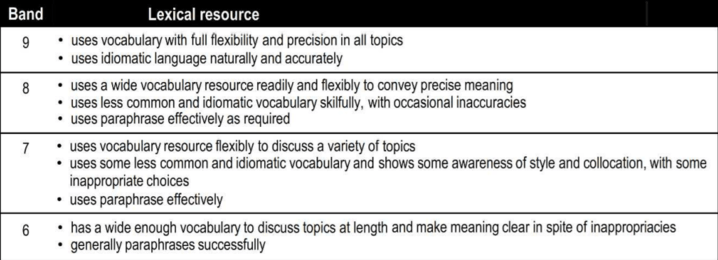
Lexicon means language or dictionary. Hence, the resource related to language is called lexical resource. From observations, one could say that IELTS looks for three points while judging the lexical resource of any student.
Variety of words or rare repetition of words
The examiner wants to judge your ability to use a variety of words while speaking. Unfortunately, many students believe that they must use hi-fi words.
However, it is essential to realise that the purpose of IELTS is not to find the next Shakespeare. It merely wishes to distinguish people who can speak English well from the ones who cannot.
Also, since most of us don’t know these rare words, we may not use them properly. Such misuse may lead to penalties in the final scores.
Precision in using the words
The candidate may use a high level of vocabulary, but the intended meaning changes if it is not used in the right context. Such inappropriate usage of the words might affect your scores adversely.
Apt usage of typical phrases and collocations
You will be awarded a higher band if you can use phrases and collocations in the sentences.
Phrases are specific groups of words that are used together. They mean exactly what the words indicate. ‘I am about to send a letter.’ In this sentence, ‘I am about to’ is a typical phrase that can be used to tell what you intend to do soon.
A collocation is a pair of words used together more often than not. ‘office desk’, ‘bright day’ or ‘cold winters’ are all collocations.
I don’t know a word in English for some words in my mother tongue. What should I do?
This is a general question for students with English as a second language.
First, ensure that actually there is no similar word in English for the word you are searching for. Many times simply you may be unaware of these words.
Once you are sure that you cannot explain your concept using the words in English, you may use the local word. However, do NOT forget to define that term in English assuming the IELTS examiner doesn’t know anything about it.
C. Grammatical range and accuracy – Guidelines
• make as few grammatical errors as possible (use the correct verb tense, subject-verb
agreement;
• use a range of complex sentences

In this criterion, the correctness of grammar is checked. It includes the accuracy of the tenses, articles, prepositions, adjectives, adverbs etcetera.
To use a language, the speaker must have proficiency over the usage of tenses. For example, if the student is asked about his hobbies during childhood, he must use the simple past tense to illustrate childhood or past hobbies.
The examiner also wants to see whether the candidate can use a variety of sentences while speaking. Some students make use of only simple sentences. A better band can be achieved by using compound and complex sentences.
D. Pronunciation – Guidelines
• group words within sentences (chunking)
• highlight the important words (stress)
• raise and lower the pitch of your voice (intonation)
• produce the correct sounds
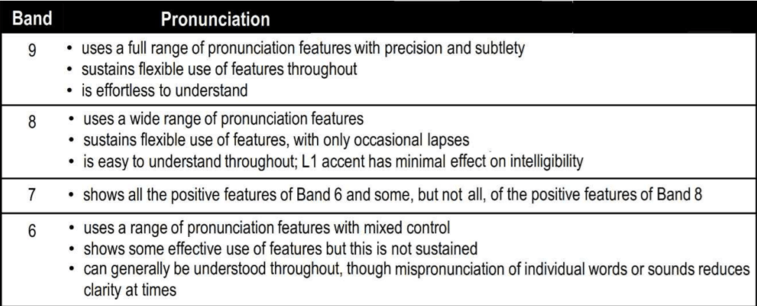
The last thing that IELTS examiner looks for in your IELTS Speaking test is Pronunciation. This criterion is related to how well do you pronounce a word. Overall, there are four critical aspects that IELTS interviewer pays attention to.
- Your speech must have understandable and acceptable sounds.
- Your speech should have a rare influence on mother-tongue.
- The speech must have appropriate pauses.
- You must have rare fillers.
Understandable and acceptable sounds
If a person sitting opposite to you can understand what you are speaking about and is not irritated by the pronunciations, I guess you are doing well.
Taking this advice to an extreme, many students believe that they must have a British accent to score well.
Rare influence of mother tongue
The influence of mother-tongue on your speech should be scarce. For example, some people say ESKUL instead of saying SCHOOL. This is not acceptable.
Appropriate pauses
Pauses mainly serve two purposes. Firstly, appropriate breaks help the listener to understand your speech well. Secondly, pauses offer a breather for the speaker.
Rare fillers
The fillers are sounds that are so repetitive that the listener cannot concentrate on the communication and hence is distracted. Typical sounds like hmmm, ah after every word can be distracting. Not only these sounds but some word which is repeated too often can act as fillers. Typical words such as, “you know”, “actually” or “basically” or any other for that matter, when used in every sentence might be a filler.
Even after understanding all these criteria, many students ask the following questions.
Does eye contact matter in the IELTS Speaking test?
IELTS doesn’t say that the examiner would be keenly looking for these things or not. However, from experience, I can say that you should not worry too much about these things.
Having said that, ensure that you maintain sufficient eye contact. You should not stare at the wall or avoid the other extreme, that is don’t stare at the examiner as well too long. It might make the person uncomfortable.
What kind of clothing should I wear on IELTS Speaking test day?
On the exam day, I would recommend a formal attire as far as the clothing is concerned. Now, you need not suit up, but some formal clothes would definitely suit the occasion. Some students who are not very comfortable with shirts and trousers may even try a plain t-shirt and jeans. Ensure that you wear a pair of shoes to the interview.
I sincerely hope that you have understood the task well. Best luck for your preparations.


